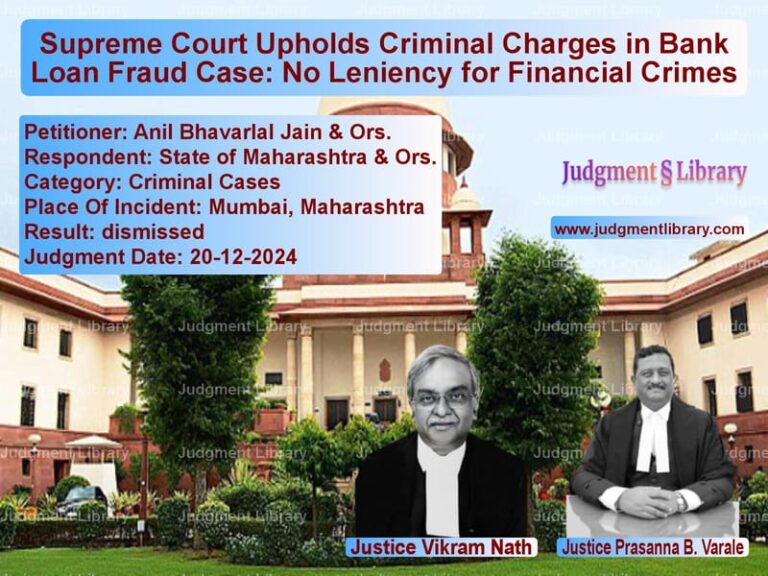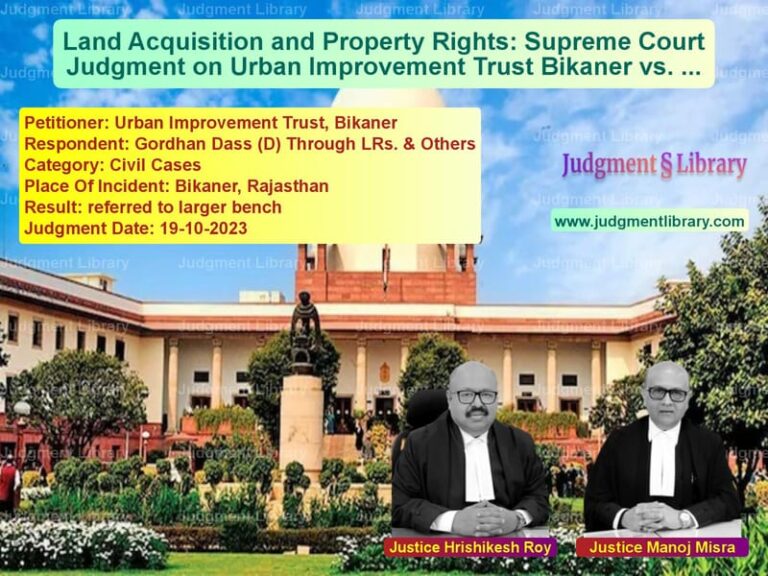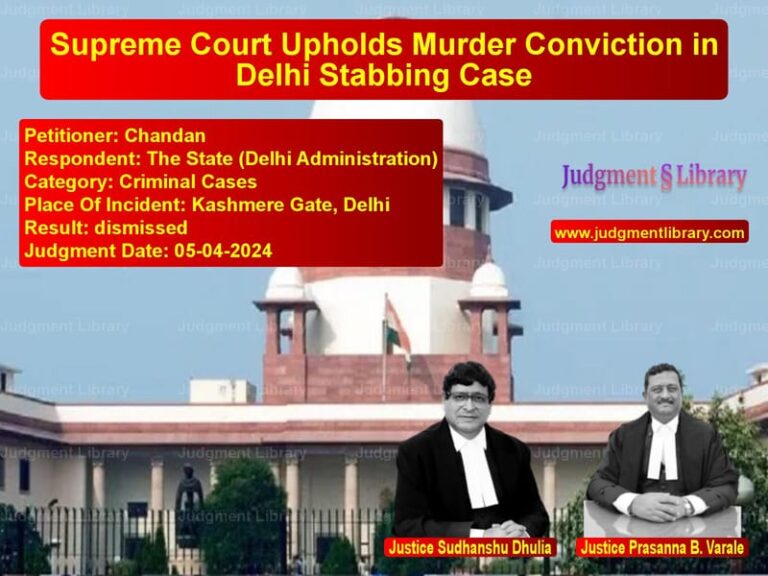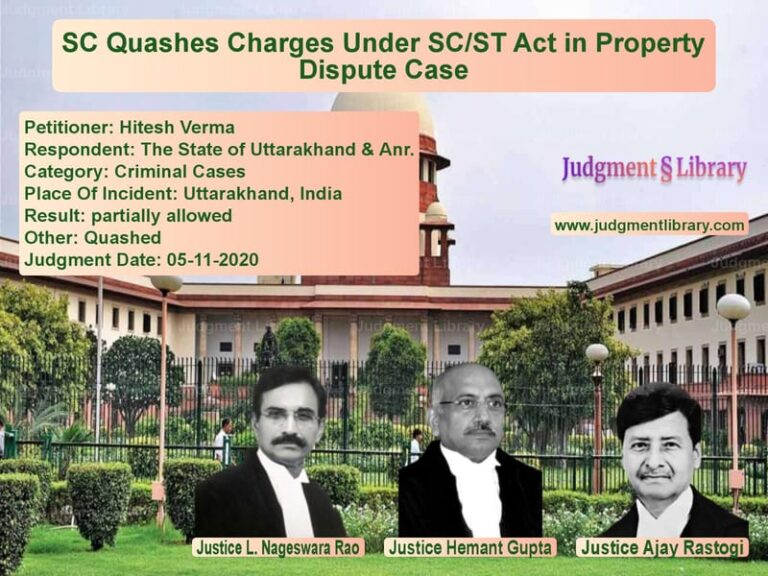Legal Interpretation of Settlement and Gift Deeds in Property Disputes
The case of Ramachandra Reddy (Dead) Thr. LRs. & Ors. vs. Ramulu Ammal (Dead) Thr. LRs. is a significant legal dispute concerning property inheritance and the distinction between settlement deeds and gift deeds. The Supreme Court of India delivered its judgment in this matter on November 14, 2024, addressing crucial aspects of property law and contractual obligations. This case highlights the complexities involved in family settlements, oral partitions, and the interpretation of legal documents in property disputes.
The dispute primarily arose due to conflicting claims over ancestral property. The plaintiffs (legal heirs of Govindammal) sought partition and possession of their alleged 2/3rd share based on a settlement deed executed in 1963. However, the defendants contested the claim, arguing that the property had already been divided orally and that the settlement deed in question was, in reality, a gift deed rather than a settlement.
Background of the Case
The origins of this dispute date back to the family of one Balu Reddy, who had three sons: Venkatarama Reddy, Venkata Reddy @ Pakki Reddy, and Chenga Reddy. These brothers held joint ownership of certain properties as part of their Hindu Undivided Family (HUF). Upon their passing, their respective legal heirs inherited their shares:
- Venkatarama Reddy’s son, Markandeya Reddy, inherited his share.
- Venkata Reddy’s daughter, Govindammal, inherited his share.
- Chenga Reddy, who died issueless, transferred his share to Govindammal through a settlement deed in 1963.
According to the plaintiffs, this deed granted Govindammal absolute rights over 2/3rd of the property, and she remained in uninterrupted possession of the said share. However, problems arose when, in 1986, the original settlement deed was handed over to Markandeya Reddy for official documentation purposes but was never returned. This led to the plaintiffs filing a suit for partition in 1995.
Pleadings of the Parties
Plaintiffs’ Claims
The plaintiffs sought the following reliefs from the court:
- A decree for partition and separate possession of the 2/3rd share in favor of the plaintiffs.
- A direction to the defendants to pay the costs of the suit.
- Any other reliefs as deemed fit by the court.
Defendants’ Counterarguments
The defendants presented the following points in their written statement:
- In 1984, a Panchayat decision led to a division of the property, granting equal shares to both parties.
- Survey No. 201/1 was incorrectly included in the plaintiffs’ name, and corrections were made in official records without objection.
- The defendants had rights over a lake on the property and maintained that the plaintiffs were not in joint possession, thereby negating their claim for partition.
Findings of the Trial Court
The Trial Court framed several key issues, including:
- Whether the suit properties were accurately described?
- Whether the properties rightfully belonged to the plaintiffs?
- Whether the 1963 settlement deed was valid and enforceable?
- Whether there was any oral partition in 1964?
- Whether the plaintiffs were entitled to partition?
The court ruled in favor of the plaintiffs, recognizing their 2/3rd share and awarding them costs. The decision was based on the validity of the 1963 settlement deed and the absence of evidence supporting oral partition.
First Appellate Court’s Decision
The First Appellate Court reaffirmed the Trial Court’s judgment, concluding:
- The settlement deed was executed for valuable consideration.
- Govindammal’s legal heirs were entitled to the 2/3rd share.
- The defendants failed to prove an oral partition in 1964.
High Court’s Reversal
The High Court overturned the concurrent findings, ruling that:
- The settlement deed was, in fact, a gift deed.
- Oral partition had not been established.
- The plaintiffs were only entitled to a half share rather than 2/3rd.
Supreme Court’s Verdict
Key Legal Questions
The Supreme Court focused on:
- Whether the High Court was justified in overturning concurrent findings?
- Whether the settlement deed was a gift deed?
Arguments of the Appellants
- The settlement deed was supported by valid consideration.
- The High Court overstepped its jurisdiction.
- Family arrangements should be upheld under established legal principles.
Arguments of the Respondents
- The document lacked monetary consideration and was therefore a gift.
- Oral partition was supported by tax records.
Supreme Court’s Reasoning
The Supreme Court ruled that:
- Consideration need not be monetary. The caretaking responsibilities of Govindammal constituted valid consideration.
- The High Court erred in reclassifying the settlement deed as a gift.
- Govindammal’s heirs were entitled to 2/3rd share as per the original settlement deed.
Accordingly, the Supreme Court set aside the High Court’s judgment and restored the Trial Court’s and First Appellate Court’s findings, allowing the appeal in favor of the plaintiffs.
Conclusion
This ruling sets an important precedent regarding the interpretation of settlement deeds in property disputes. It clarifies that consideration can take non-monetary forms, especially in family arrangements, reinforcing the protection of legally valid settlements in inheritance matters.
Petitioner Name: Ramachandra Reddy (Dead) Thr. LRs. & Ors..Respondent Name: Ramulu Ammal (Dead) Thr. LRs..Judgment By: Justice C.T. Ravikumar, Justice Sanjay Karol.Place Of Incident: Chengalpattu, Tamil Nadu.Judgment Date: 14-11-2024.
Don’t miss out on the full details! Download the complete judgment in PDF format below and gain valuable insights instantly!
Download Judgment: ramachandra-reddy-(d-vs-ramulu-ammal-(dead)-supreme-court-of-india-judgment-dated-14-11-2024.pdf
Directly Download Judgment: Directly download this Judgment
See all petitions in Property Disputes
See all petitions in Succession and Wills
See all petitions in Specific Performance
See all petitions in Judgment by C.T. Ravikumar
See all petitions in Judgment by Sanjay Karol
See all petitions in allowed
See all petitions in supreme court of India judgments November 2024
See all petitions in 2024 judgments
See all posts in Civil Cases Category
See all allowed petitions in Civil Cases Category
See all Dismissed petitions in Civil Cases Category
See all partially allowed petitions in Civil Cases Category







